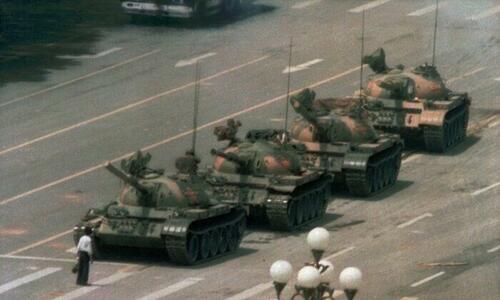
On the 35th anniversary of the Tiananmen Square protests, human rights supporters continued to speak up about the democratic uprising that was brutally suppressed by the Chinese Communist Party (CCP) on June 4, 1989.
The incident led to a massive death toll among unarmed students, and for decades, the CCP has systematically censored all information related to the massacre.
“People commemorate the ‘June 4 Incident’ because it symbolizes universal values such as democracy, freedom, human rights, and peaceful protest. It stands as a bloody testament to the courage and resistance of the Chinese people,” said Du Wen, the former executive director of the Legal Advisory Office of the Inner Mongolia Autonomous Region Government, now in exile in Europe.
He told the Chinese language edition of The Epoch Times that his generation remains nostalgic about the June 4 incident even though it is nearly impossible to find any trace of it inside China, where any discussion of it is taboo.
As Mary Hong reports, that large-scale democratic movement provided the Chinese Communist Party (CCP) with an excellent opportunity to peacefully transition from autocracy to democracy. At that time, the young students did not make any demands regarding the CCP’s power itself. Their demands were solely for freedom of the press and speech, expressing dissatisfaction only with the corruption among the CCP elite. The interest of young students in national affairs was largely due to the enlightened thinking and reformist spirit of two successive CCP General Secretaries, Hu Yaobang and Zhao Ziyang.
However, CCP elders, represented by Chen Yun, believed that the students’ calls for freedom and democracy challenged the very foundation of CCP rule. Consequently, the hardliner Deng Xiaoping ordered the violent suppression of the democratic movement. While this temporarily stabilized the regime, the opportunities that the democratic movement presented to both the CCP and China were lost.
The wound of history is still bleeding. China continues to pay a heavy price for the massacre. The issues that the students demanded the CCP address at that time did not disappear, instead, they have accumulated over history. The massacre made the CCP’s perceived legitimacy even more fragile in the eyes of the people. Many say that the CCP lost its legitimacy because of the “June 4th” massacre. I have always disagreed with this view. The CCP regime forcibly seized power from the Republic of China with the blatant military intervention of the Soviet Union. Claiming legitimacy for something taken by force is itself absurd and laughable. Moreover, the Chinese people never had the opportunity to question the legitimacy and effectiveness of the CCP’s governance. Objectively speaking, since 1949, the Chinese people have tacitly accepted a new regime imposed on them, thus the existence of the CCP regime at most holds a semblance of reasonableness. However, in the minds of the Chinese people, this reasonableness was significantly damaged by the “June 4th” massacre.
What is reasonable is real, and what is real is reasonable.
It can be asserted that if there were to be another political upheaval, the CCP would find itself in a difficult position, unable to save itself.
At that time, the Chinese people would not be as compliant as they were in 1989 and might very well seize the opportunity to overturn the CCP’s rule.
When we observe the massacre 35 years ago within the context of the global landscape, it becomes clear that Deng Xiaoping’s drastic measures to maintain the CCP’s rule and power were met with tacit acceptance by then-U.S. President Bush.
Although the CCP briefly faced diplomatic isolation, Deng Xiaoping’s resoluteness prevailed over the weak and short-sighted West.
We must also clarify that the 75 years of suffering endured by the Chinese people under the CCP’s iron rule were not the choice of the Chinese people but were imposed on them by former U.S. President Harry Truman and Soviet leader Joseph Stalin.
This imposition began with former U.S. President Franklin Roosevelt’s betrayal and sellout of wartime ally the Republic of China at the Yalta Conference, which allowed Stalin to occupy Northeast China.
President Truman’s China policy further aided the CCP in sweeping across the entire Chinese mainland, plunging the Chinese people into the horrors and ravages of communism.
Today, we remember June 4th. Although we commemorate it every year, we must clearly recognize the harsh reality: its impact on changing China’s existing autocratic system is extremely minimal, resonating only with a small, determined minority of Chinese democracy campaigners. The struggle between the Chinese people and the CCP is akin to a battle between humans and beasts, a war between people and demons, with almost no chance of success or victory. Despite this, we continue to pursue the day when the Chinese people can free themselves from the CCP’s brutal autocratic rule with perseverance.
Under Xi Jinping’s leadership for the past 12 years, China’s national conditions have been regressing at an unprecedented speed and scale. The achievements of forty years of economic reform have been completely eroded. Politically, the country is experiencing a “Cultural Revolution 2.0,” reminiscent of Mao Zedong’s era. Social morals have decayed, and the collapse of Chinese society and the sudden fall of the CCP’s autocratic regime seem imminent. This represents a political opportunity for significant change in China.
Coincidentally, the world is also beginning to regress and retreat. The United States, once a post-war beacon of democracy, freedom, and civilization respected and admired worldwide, has morally collapsed. Justice in the world is severely lacking, and the world is rapidly plunging into an abyss. This outcome is a result of the global trend, driven by the development and evolution of the world socialist and communist movements, spurred by malevolent forces, beyond human ability to reverse.
Where is the world headed? There is a sense that God has already issued a warning. If humanity does not awaken and change its course, the angry God may once again unleash a great flood to prevent human depravity.
On the 35th anniversary of the Tiananmen Square protests, human rights supporters continued to speak up about the democratic uprising that was brutally suppressed by the Chinese Communist Party (CCP) on June 4, 1989.
The incident led to a massive death toll among unarmed students, and for decades, the CCP has systematically censored all information related to the massacre.
“People commemorate the ‘June 4 Incident’ because it symbolizes universal values such as democracy, freedom, human rights, and peaceful protest. It stands as a bloody testament to the courage and resistance of the Chinese people,” said Du Wen, the former executive director of the Legal Advisory Office of the Inner Mongolia Autonomous Region Government, now in exile in Europe.
He told the Chinese language edition of The Epoch Times that his generation remains nostalgic about the June 4 incident even though it is nearly impossible to find any trace of it inside China, where any discussion of it is taboo.
As Mary Hong reports, that large-scale democratic movement provided the Chinese Communist Party (CCP) with an excellent opportunity to peacefully transition from autocracy to democracy. At that time, the young students did not make any demands regarding the CCP’s power itself. Their demands were solely for freedom of the press and speech, expressing dissatisfaction only with the corruption among the CCP elite. The interest of young students in national affairs was largely due to the enlightened thinking and reformist spirit of two successive CCP General Secretaries, Hu Yaobang and Zhao Ziyang.
However, CCP elders, represented by Chen Yun, believed that the students’ calls for freedom and democracy challenged the very foundation of CCP rule. Consequently, the hardliner Deng Xiaoping ordered the violent suppression of the democratic movement. While this temporarily stabilized the regime, the opportunities that the democratic movement presented to both the CCP and China were lost.
The wound of history is still bleeding. China continues to pay a heavy price for the massacre. The issues that the students demanded the CCP address at that time did not disappear, instead, they have accumulated over history. The massacre made the CCP’s perceived legitimacy even more fragile in the eyes of the people. Many say that the CCP lost its legitimacy because of the “June 4th” massacre. I have always disagreed with this view. The CCP regime forcibly seized power from the Republic of China with the blatant military intervention of the Soviet Union. Claiming legitimacy for something taken by force is itself absurd and laughable. Moreover, the Chinese people never had the opportunity to question the legitimacy and effectiveness of the CCP’s governance. Objectively speaking, since 1949, the Chinese people have tacitly accepted a new regime imposed on them, thus the existence of the CCP regime at most holds a semblance of reasonableness. However, in the minds of the Chinese people, this reasonableness was significantly damaged by the “June 4th” massacre.
What is reasonable is real, and what is real is reasonable.
It can be asserted that if there were to be another political upheaval, the CCP would find itself in a difficult position, unable to save itself.
At that time, the Chinese people would not be as compliant as they were in 1989 and might very well seize the opportunity to overturn the CCP’s rule.
When we observe the massacre 35 years ago within the context of the global landscape, it becomes clear that Deng Xiaoping’s drastic measures to maintain the CCP’s rule and power were met with tacit acceptance by then-U.S. President Bush.
Although the CCP briefly faced diplomatic isolation, Deng Xiaoping’s resoluteness prevailed over the weak and short-sighted West.
We must also clarify that the 75 years of suffering endured by the Chinese people under the CCP’s iron rule were not the choice of the Chinese people but were imposed on them by former U.S. President Harry Truman and Soviet leader Joseph Stalin.
This imposition began with former U.S. President Franklin Roosevelt’s betrayal and sellout of wartime ally the Republic of China at the Yalta Conference, which allowed Stalin to occupy Northeast China.
President Truman’s China policy further aided the CCP in sweeping across the entire Chinese mainland, plunging the Chinese people into the horrors and ravages of communism.
Today, we remember June 4th. Although we commemorate it every year, we must clearly recognize the harsh reality: its impact on changing China’s existing autocratic system is extremely minimal, resonating only with a small, determined minority of Chinese democracy campaigners. The struggle between the Chinese people and the CCP is akin to a battle between humans and beasts, a war between people and demons, with almost no chance of success or victory. Despite this, we continue to pursue the day when the Chinese people can free themselves from the CCP’s brutal autocratic rule with perseverance.
Under Xi Jinping’s leadership for the past 12 years, China’s national conditions have been regressing at an unprecedented speed and scale. The achievements of forty years of economic reform have been completely eroded. Politically, the country is experiencing a “Cultural Revolution 2.0,” reminiscent of Mao Zedong’s era. Social morals have decayed, and the collapse of Chinese society and the sudden fall of the CCP’s autocratic regime seem imminent. This represents a political opportunity for significant change in China.
Coincidentally, the world is also beginning to regress and retreat. The United States, once a post-war beacon of democracy, freedom, and civilization respected and admired worldwide, has morally collapsed. Justice in the world is severely lacking, and the world is rapidly plunging into an abyss. This outcome is a result of the global trend, driven by the development and evolution of the world socialist and communist movements, spurred by malevolent forces, beyond human ability to reverse.
Where is the world headed? There is a sense that God has already issued a warning. If humanity does not awaken and change its course, the angry God may once again unleash a great flood to prevent human depravity.
Loading…




